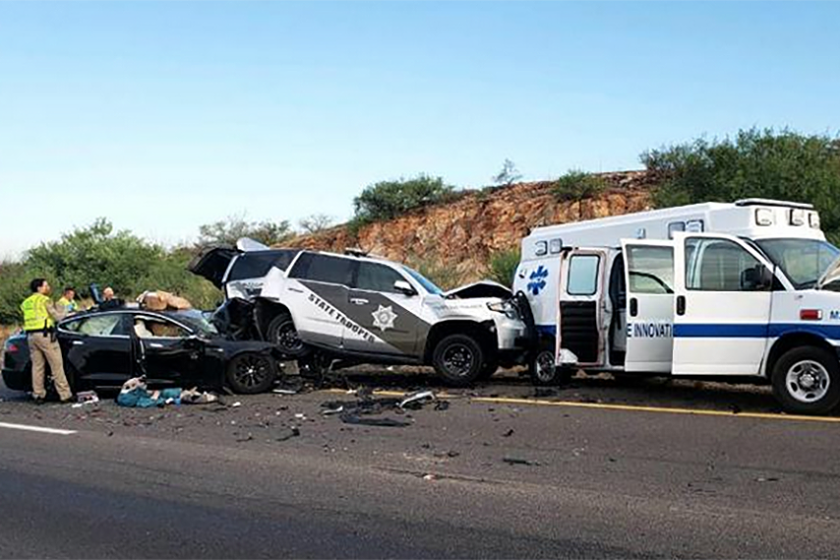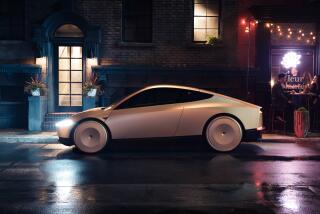Tesla to move headquarters to Texas from Palo Alto

Tesla is moving its Palo Alto headquarters to Austin, Texas, Chief Executive Elon Musk said Thursday.
Speaking at the company’s annual shareholders meeting, he added little detail and did not explain why he’s making the move or how the move will affect the headcount at the Palo Alto offices, which include research and development operations.
However, Musk emphasized that “this is not a matter of leaving California” and said the Fremont auto assembly plant and the Nevada plant near Reno will each grow by 50%, though he gave no timeline. “Our Fremont plant is jammed, whoa,” he said. “We’re continuing to expand in California significantly.”
While regulators investigate a spate of Teslas steering themselves into parked vehicles, Tesla owners have been reporting faulty collision-avoidance systems.
Musk moved to Austin himself late last year and has sold several homes in Los Angeles. He said recently that he plans to cash in on many of his Tesla stock options soon. Taxes are much lower in Texas, both for businesses and individuals.
Database software giant Oracle last year announced a headquarters move from Silicon Valley to Texas. Oracle founder Larry Ellison sits on Tesla’s board of directors.
Earlier this year, Los Angeles engineering giant Aecom, whose name is emblazoned on one of the city’s skyscrapers, said it is moving its headquarters to Dallas-Fort Worth.
Musk last year expressed deep disenchantment with the Golden State. During a standoff with authorities over his plans to reopen operations in Fremont amid stay-at-home orders aimed at containing the spread of COVID-19, he tweeted, “Frankly, this is the final straw. Tesla will now move its HQ and future programs to Texas/Nevada immediately.”
When Alameda County’s director of public health told Musk he had to suspend manufacturing, Musk called her order “fascist” and volunteered to be arrested. The county reversed course, allowing the Fremont factory to stay open.
Manufacturers across the state complain about California’s living costs, business costs, taxes, bureaucratic red tape and what are decried as onerous regulations. But Tesla has enjoyed billions in subsidies from the state and the federal government and gets state tax breaks from the California Alternative Energy and Advanced Transportation Financing Authority. The California Department of Motor Vehicles, meanwhile, is allowing Tesla to test driverless vehicles on public highways free of the regulations the DMV applies to all other autonomous vehicle developers.
Tesla was founded in 2003 by Martin Eberhard and Marc Tarpenning in Silicon Valley. Musk joined the company the following year and won the right to call himself a co-founder as part of a lawsuit settlement.
In 2010, Tesla bought a defunct General Motors/Toyota assembly plant in Fremont. In late 2019 the company opened an assembly plant in Shanghai, and it currently is building assembly plants in Austin and Brandenburg, Germany.
The Shanghai plant now makes more vehicles than the one in Fremont, Musk said, adding that there is “less drama” there than in Fremont. On Monday, a jury ordered Tesla to pay a contract worker $137 million in a case that alleged rampant and company-tolerated racism at the Fremont factory.
After Texas enacted one of the country’s most restrictive abortion bans, Gov. Greg Abbott cited companies relocating offices from California to Texas as proof that business owners prefer the state’s social policies and personally name checked Musk, with whom he said he spoke frequently. “Elon had to get out of California in part because of the social policies of California,” Abbott said on CNBC.
Responding to Abbott’s claim, Musk said, “In general, I believe government should rarely impose its will upon the people, and, when doing so, should aspire to maximize their cumulative happiness. That said, I would prefer to stay out of politics.”
The annual meeting started off with several proposals to improve workforce equity and inclusion at Tesla, and one to have Tesla study the effects of employee mandatory arbitration agreements on workers and on the company. All were rejected by a majority vote of shareholders.
More to Read
Inside the business of entertainment
The Wide Shot brings you news, analysis and insights on everything from streaming wars to production — and what it all means for the future.
You may occasionally receive promotional content from the Los Angeles Times.












